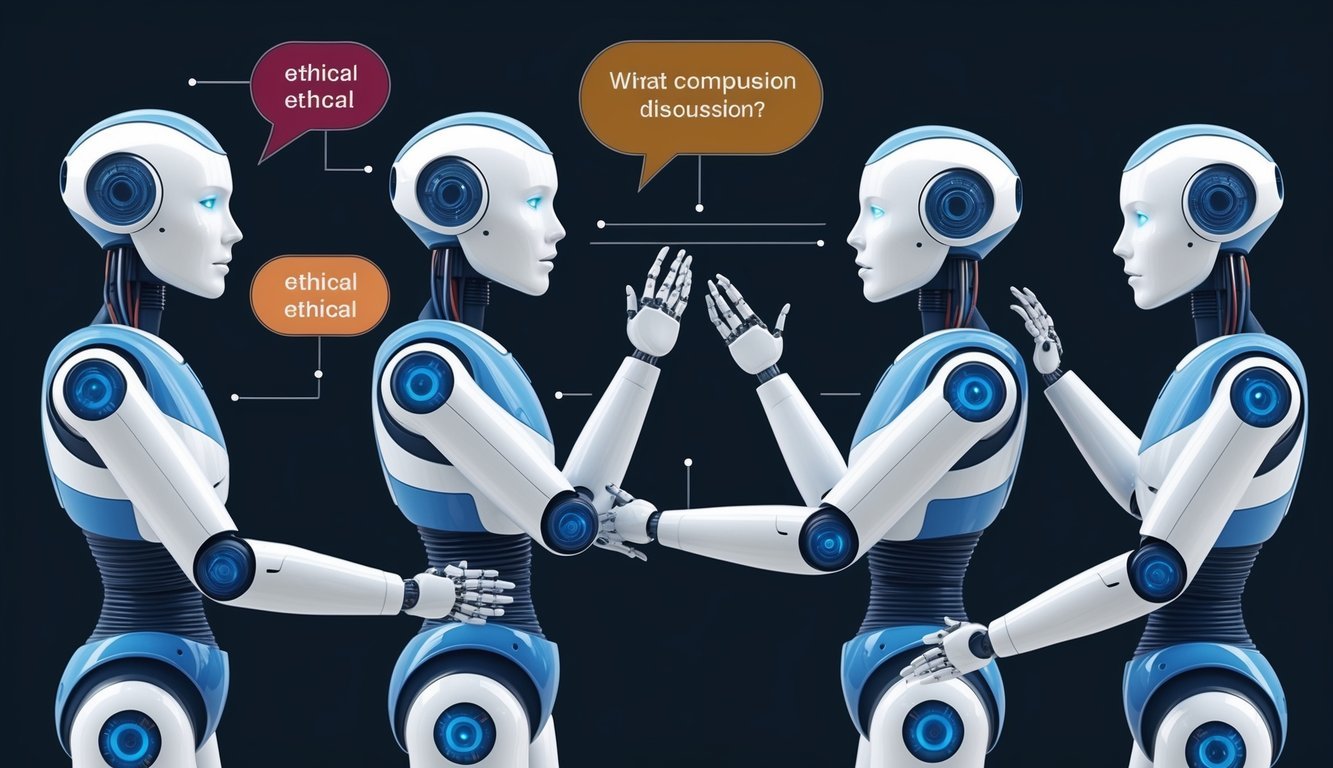“`xml
Artificial intelligence is changing our world at lightning speed, and with that comes a responsibility to use it safely and fairly.
If you’re curious about AI ethics, you’re not alone! Understanding the key issues—from bias to privacy—can help you make better decisions in this rapidly evolving landscape.

Taking an AI ethics course can really amp up your skills and career opportunities. You’ll dive into crucial topics like bias, privacy, and how AI impacts our society.
These courses offer practical tools to tackle real-world challenges in AI.
Whether you’re in tech or just curious, an AI ethics course could be your next smart step.
1) “AI Ethics: Privacy, Compliance, and Bias” by UC Berkeley

If you want to understand the ethical challenges of AI, UC Berkeley’s “AI Ethics: Privacy, Compliance, and Bias” course is a fantastic option.
This online program digs into the hot topics within AI ethics.
You’ll learn about the privacy concerns tied to AI systems, legal and regulatory compliance, and how we can tackle bias in algorithms.
Their expert instructors will take you through real-world case studies, giving you hands-on experience in addressing ethical dilemmas.
Plus, the course is self-paced, so you can easily fit it into your busy life, whether you’re a professional working with AI or just keen to learn more.
By the end, you’ll feel confident in your grasp of AI ethics principles, making you well-equipped to make responsible choices with AI technologies.
Excited to deepen your knowledge? Check out the course details and sign up here.
2) “Artificial Intelligence Ethics and Society” by University of Washington
The University of Washington has a captivating course on AI ethics.
You’ll unpack the tricky bits of using AI in the real world.
The class looks at bias in AI tools.
For instance, it’s been shown that AI might favor specific names when ranking job applicants.
You’ll also explore how to identify and fix these biases.
You’ll gain insight into AI’s far-reaching effects on society, tackling big questions like privacy, fairness, and the impact of AI on jobs.
Expect to get hands-on with projects where you might analyze real AI systems or design your own ethical AI tool.
You don’t need to be a tech whiz, just a curiosity about how AI shapes our lives!
3) “Ethics of AI” by University of Helsinki
Want to dive into AI ethics without spending a dime? Check out the Ethics of AI course from the University of Helsinki.
It’s open to everyone and completely free.
This course will help you understand what ethical AI use really means.
You’ll investigate both the positives and negatives AI brings to our society.
Concerned about AI’s implications? This program will arm you with the tools to think critically about AI ethics, guiding what individuals and society should do for responsible use of AI.
It’s not just for tech enthusiasts, either; it’s crafted for everyday people, government workers, and business professionals alike.
You’ll get to see real-world examples from cities like Helsinki and Amsterdam, plus insights from Finland’s Finance Ministry.
By the end of the course, you’ll be getting sharp on a crucial skill that’s increasingly vital in our tech-driven world.
4) “AI: Ethics and Societal Impacts” by IBM
If you’re curious about the ethical aspects of AI, check out IBM’s “AI: Ethics and Societal Impacts” course.
This free, online class walks you through key ethical issues in AI.
You’ll examine how AI impacts society, focusing on issues like bias, privacy, and job changes.
If you’re interested in the broader ramifications of AI tech, this course is just what you need.
Expect to roll up your sleeves and engage with real-world ethical cases in AI.
You’ll also learn how to identify and tackle ethical problems in AI systems.
The best part? It’s self-paced, designed for beginners, so you can start learning without needing any specialized background.
When you finish, you’ll have a solid grasp of the ethics in AI, helping you make smarter decisions about AI in both your professional and personal life.
Understanding AI Ethics

AI ethics tackles the moral dilemmas that pop up when we use artificial intelligence.
It’s about understanding how AI affects individuals and societies.
Let’s break down the core concepts and why they’re important.
Core Principles of AI Ethics
When it comes to AI ethics, there are some key rules we should all follow to ensure AI is used positively:
First off, AI should be fair.
It shouldn’t treat people differently based on race or gender.
Next up, transparency is key.
Users should understand how AI makes decisions.
Privacy is non-negotiable.
AI needs to respect individual data and not misuse it.
Last but not least, AI should be safe and reliable.
We can’t afford mistakes that might harm people.
These principles guide us as we create and use AI, and they’re taught in courses like Ethics of Artificial Intelligence on Coursera.
Why Ethics Matter in AI
AI ethics matters—big time.
Here’s why:
AI can have a huge impact on people’s lives.
It can determine who gets a loan or a job, making fairness essential.
AI also makes significant decisions, like those in self-driving cars or medical diagnostics.
A mistake here could be dangerous.
AI learns from data, and if that data has issues, AI might make unfair decisions that harm certain groups.
As AI becomes smarter, we must ensure it assists rather than harms.
This is why courses like Ethics and AI: A Philosophical Guide are invaluable.
By learning about AI ethics, you can help steer technology toward positive outcomes.
It’s an essential skill for anyone working in the field.
Key Topics in AI Ethics

AI ethics courses cover vital issues that shape how we responsibly develop and utilize AI.
These topics aim to build AI systems that respect human rights and values.
Bias and Fairness
AI systems can pick up and even amplify existing human biases.
This can lead to unfair treatment of different groups.
In these courses, you’ll learn how to identify and address these biases in AI.
Through AI ethics courses, you’ll explore methods to examine data and algorithms for hidden biases.
You’ll learn how to ensure AI remains equitable for all, regardless of race, gender, or background.
Real-world examples illustrate the stakes.
For example, an AI hiring tool might unjustly reject qualified women, or facial recognition technology might falter with people of color.
You’ll learn testing techniques to catch these issues before they lead to real harm.
Privacy and Data Security
AI often requires a lot of data to function effectively.
But this can jeopardize people’s private information.
You’ll discover how to strike a balance between AI’s capabilities and the need for privacy protection.
Courses on AI ethics will cover ways to keep data safe and secure.
You’ll learn about techniques like encryption and anonymization, which allow us to utilize data for AI without exposing personal information.
Plus, you’ll explore compliance with regulations that guide AI and data privacy, so you can create solutions that respect user privacy.
Frequently Asked Questions

AI ethics courses are gaining traction as more people want to understand the ethical implications of artificial intelligence.
Here are some common questions you might have about these courses.
What’s the best online course for learning AI ethics?
You’ve got some fantastic options out there. UC Berkeley’s “AI Ethics: Privacy, Compliance, and Bias” is a top-of-the-line choice that covers crucial topics like data privacy and algorithm fairness.
Another great pick is the University of Helsinki’s “Ethics of AI”, which is totally free and offers a solid grounding in AI ethics concepts.
Can I study AI ethics courses online without charges?
Absolutely! You can find free AI ethics courses online.
The University of Helsinki’s “Ethics of AI” is completely free.
Platforms like Coursera even offer financial aid for many courses, and you can audit some for free (you just won’t get a certificate).
How do I kick-start a career as an AI ethicist, and what’s the pay like?
To get started in AI ethics, enroll in courses like IBM’s “AI: Ethics and Societal Impacts”.
Building a robust background in AI and ethics is key, as is networking with professionals in the field.
Salaries for AI ethicists can vary widely, typically ranging from $70,000 to over $150,000 annually.
Are there any AI programs focused on the different types of AI?
Yes! Many AI ethics courses address various types of AI.
For instance, the University of Washington’s “Artificial Intelligence Ethics and Society” program covers different AI applications and their ethical implications.
Does the AI industry have an ethics board I can learn about?
There isn’t one unified ethics board in the AI industry.
Many tech companies have their own ethics committees, and organizations like the IEEE and ACM have established guidelines for AI ethics.
Courses often touch on these industry efforts.
What qualifications are necessary to enroll in an AI ethics course?
Most AI ethics courses don’t have specific prerequisites.
While background knowledge of AI concepts can be helpful, many courses are accessible to beginners.
Just check the requirements for each course before diving in.
“`

